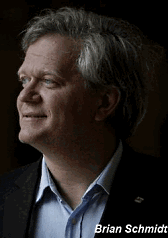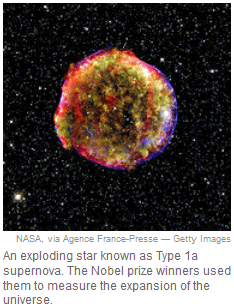
|
News & Views item - December 2011 |
![]() Australia's Astrophysicist Nobel Laureate Pleads for Improvement of Public
Education -- Donates $100,000 for AAS' "Primary Connections" Project.
(December 7, 2011)
Australia's Astrophysicist Nobel Laureate Pleads for Improvement of Public
Education -- Donates $100,000 for AAS' "Primary Connections" Project.
(December 7, 2011)
 The Australian's Jill Rowbotham interviewed ANU's Nobel Laureate
Astrophysicist Brian Schmidt shortly before he was to leave for Stockholm to
attend the prize winning ceremonies on December 10.
The Australian's Jill Rowbotham interviewed ANU's Nobel Laureate
Astrophysicist Brian Schmidt shortly before he was to leave for Stockholm to
attend the prize winning ceremonies on December 10.
He told her: "One key thing I'm trying to promote post-Nobel prize is primary and secondary education." And to that end he will donate $100,000 of the $360,000 share of the prize money to the Australian Academy of Sciences to continue the Primary Connections program. "Primary Connections has had very good penetration across the country -- 55 per cent of all primary schools have used it in one way or another -- and it is one of the most effective tools I have seen to help in teaching science to this age group.
"If you improve education for kids in primary school you get 50 years of benefit, but it doesn't accrue for another 10 or 12 years." And added: "I'm in it for the long haul. I have 21 years until I turn 65, but I want us to focus on the basics: if you do the basics well, everyone's a winner."
Previously the Department of Education had spent $9.7m on the program since 2004, the federal Minister for School Education, Peter Garrett, told the president of the Australian academy of Science, Suzanne Cory, that he had no discretionary funds available and she should seek funding elsewhere, while a department spokesman told Ms Rowbotham the program "was always intended to be a four-stage project" and that the academy could now approach Education Services Australia, recently awarded $41m in federal funding for curriculum development.
In using his background as an example Professor Schmidt told Ms Rowbotham that at the age of 13, his family moved to Alaska and he entered Bartlett High School in Anchorage. In that public high school he found a bunch of mentors, all science teachers, with whom he is still in touch. "Not only did they have science degrees of some description and most of them had masters degrees and even some work towards PhDs, but they had this great attitude and camaraderie. They would discuss with each other how they were going to teach something. This is a high school."
He also made the point that, yes, he was a bright, but "not the best student they had seen in 10 years". On the other hand he graduated at the top of his class at the University of Arizona and from there went to Harvard to undertake studies in Astrophysics. The rest, as they say, is history.
Professor Schmidt was on his way to flying out to Stockholm to attend the prize winning ceremonies on December 10.
____________________________________
In Stockholm he told The Australian's Peter Wilson: "I feel very strongly that where we have gone wrong in Australia is that politicians have made statements about science when they don't understand it and some scientists have strayed into policy instead of sticking to the science. I am going to let the experts on climate change deal with the specifics of climate change but for the record I have a very strong degree of certainty that humans adding CO2 to the atmosphere is going to cause climate change and I think there is pretty reasonable evidence that that is already occurring."